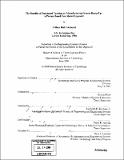The benefits of structured training on manufacturing process ramp-up : a process based cost model approach
Author(s)
Akehurst, Colleen Beth, 1976-
DownloadFull printable version (2.957Mb)
Other Contributors
Massachusetts Institute of Technology. Technology and Policy Program.
Advisor
Richard Roth, Randolph E. Kirchain, Jr. and Frank R. Field, III.
Terms of use
Metadata
Show full item recordAbstract
Manufacturing facilities ramping up a new production process are faced with critical decisions, which determine the ability of that process to be cost efficient. Without quantitative analyses, these decisions are made with limited data and may cause manufacturing problems. Two critical decisions are examined in this research: what level of structured training to provide to employees and what cycle time to run when compared with the long-term optimal cycle time. By examining these decisions and their impact on two production metrics, unplanned equipment downtime and reject rate, a series of analyses are presented. A framework for conducting analyses is developed using Process Based Cost Modeling. This framework is applied to various automobile part manufacturing processes. The results indicate that production experience is critical for reducing the two performance metrics of unplanned downtime and reject rate. Additional analyses indicate that to achieve the best cycle times, a significant investment in structured training should be provided. Analytically determining the optimal cycle time is critical to improving production ramp-up because costs increase when running other cycle times. Future work would apply this framework to other manufacturing processes and gather additional data on the processes examined here.
Description
Thesis (S.M.)--Massachusetts Institute of Technology, Engineering Systems Division, Technology and Policy Program, 2004. Includes bibliographical references (p. 79-81).
Date issued
2004Department
Massachusetts Institute of Technology. Engineering Systems Division; Technology and Policy ProgramPublisher
Massachusetts Institute of Technology
Keywords
Technology and Policy Program.